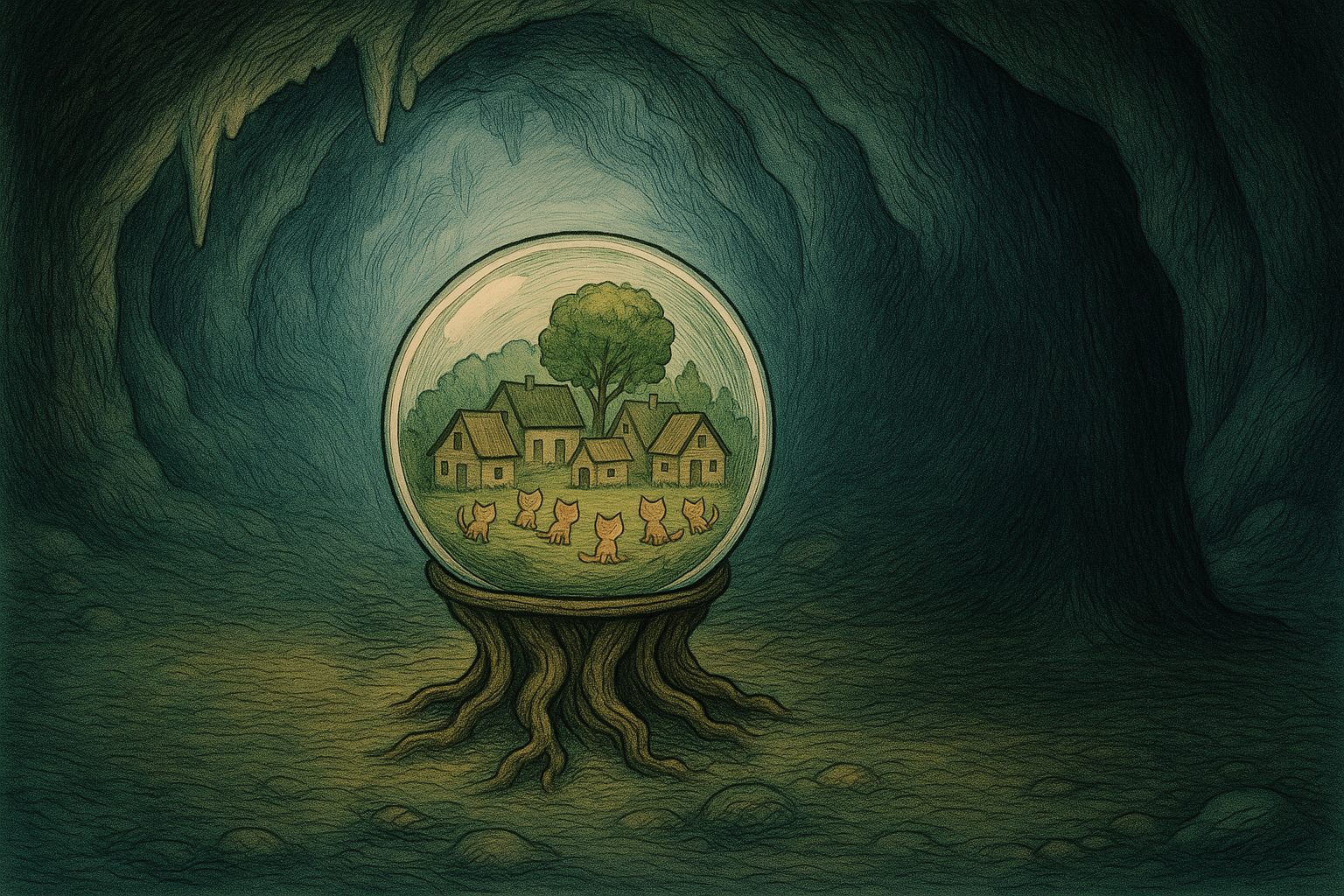
#4 Da Capo
Kater Klaus and Ole were exploring a cavern they had recently discovered deep within the Mossywood Forest. The entrance was hidden behind a thicket of bramble and mist, barely visible unless the morning light hit it just right. The path into the cavern was steep and winding, demanding more balance than grace. After much slipping, sneezing, and one impressive unplanned somersault, they finally emerged into a vast, echoing chamber beneath the earth.
There, in the center, resting on a pedestal of woven roots and stardust, was a single glass globe.
Inside it: a tiny village, with tiny creatures—fuzzy, whiskered catlets—who looked remarkably like their friends. The village was vibrant and peaceful, full of sun-dappled paths, mossy rooftops, and the faint sound of someone singing about pickled fish.
They watched in awe as the miniature world played out—naps, greetings, laughter, a minor pie mishap.
Klaus and Ole couldn’t believe their eyes and returned the next day. They both noticed that everything in the globe seemed to be repeating.
A sneeze at 9:12. A jam jar falling at noon. A kite caught in a tree before supper. Every tiny rhythm repeated like a wind-up melody.
Suddenly, on the third visit, a soft shuffle echoed through the cave.
A tall, cloaked creature approached—antlered, with eyes that looked a little like clocks.
“I am Maestro Nibbin, keeper of the Repeating World of Da Capo,” the figure intoned. “She loops. Endlessly. A perfect circle of one single day. Unaware, unchanged.”
Ole blinked. “Why?”
“Not sure,” Nibbin said. “It has always been like this. But… perhaps it is time for a little entropy. I will allow you to enter Da Capo. Just for one hundred repeats. But tread gently—your pawprints linger longer than you think. And you will remember nothing while inside.”
With a nod, Nibbin touched the globe. And everything turned to light.
The First Day
Klaus and Ole woke beneath a miniature cherry tree, in the heart of Da Capo.
The world felt… still. Peaceful, yes, but almost too perfect, like a painting afraid of being smudged. They exchanged anxious glances.
“We shouldn’t touch anything,” whispered Klaus.
“Or say anything weird,” added Ole, carefully breathing less.
The tiny villagers greeted them warmly. No one seemed to notice how out of place they were. Klaus and Ole walked stiffly, terrified of making a mistake. They followed the flow. Smiled politely. Declined offers of sardine cake.
Then, mid-morning, the first bad thing happened.
A young catlet named Luma, chasing a rolling acorn, tripped over a root and scraped her paw. Klaus rushed forward, but an older catlet was already there—bandaging her, calming her. It was over before he could help.
“She’ll do that again tomorrow,” Ole said quietly.
“And we won’t be able to stop it,” Klaus replied.
They felt helpless. Then they realized the best thing they could do was make sure no one else would trip over the same root again. So they set up a small warning sign.
But the day continued.
Around noon, the catlets gathered in the village square. A large pot of vegetable stew simmered merrily. Ole offered to help stir—but accidentally tipped in a bowl of salt instead of thyme.
The stew was ruined. The other cats kindly said it wasn’t too bad, but Klaus and Ole knew they couldn’t eat this soup a hundred times. They cooked a new batch, following a special recipe from Klaus’s grandmother. The villagers were thrilled and loved the new dish.
As the day wore on, other simple and wonderful things happened.
They played mossball with the village kittens and laughed until their stomachs ached. Klaus was given a flower crown by a very serious kitten named Cress. Ole learned a weirdly emotional folk song about turnips. They lay under the cherry tree and watched golden light ripple through the leaves.
Everything about the moment felt real, and Klaus and Ole couldn’t wait to experience those things again.
Every day, they couldn’t stop Luma’s fall—but they always made sure no one else would trip over the same root.
Every day, they ruined the stew and fixed it again.
Every day, they danced in the square like it was the first time—because it always was.
After one hundred days, the world shimmered. The loop softened. The globe quieted.
Klaus and Ole stood once more in the cave before Maestro Nibbin.
Nibbin smiled. “Welcome back! Did you enjoy Da Capo?”
They nodded.
Nibbin’s eyes ticked gently. “So I ask: would you do more? Would you live the same day again—another hundred times?”
Klaus looked at Ole.
Ole grinned. “I think we would.”
And with a final soft hum of light, they returned to the forest above—wind rustling the trees, cherry blossoms drifting like memory.
And somewhere, far below, the village of Da Capo woke again.
Just the same.